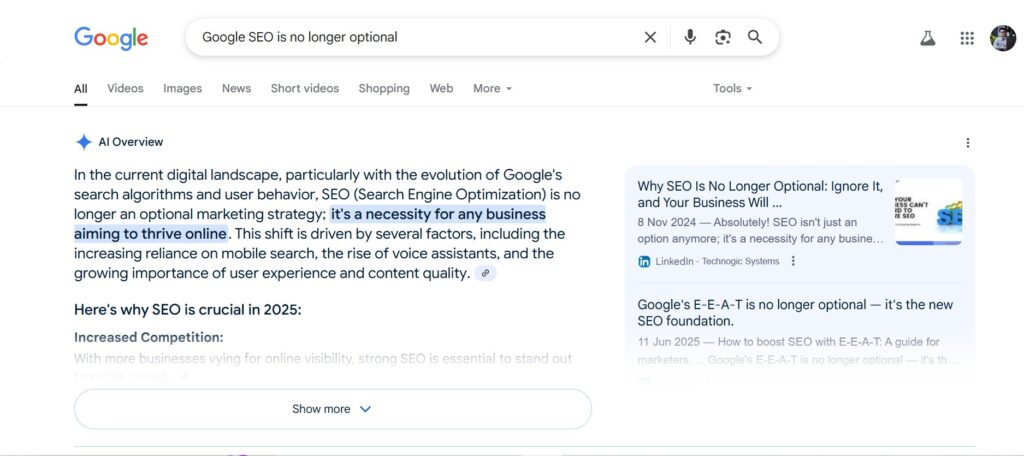Not long ago, if someone needed a service or product, they’d simply “Google it.” But in 2025, that’s no longer the full picture.
Today’s consumers are asking ChatGPT, Gemini, or turning to TikTok, Facebook, and YouTube to find answers, solutions, and recommendations.
Whether it’s a question like “best home painter near me” or “how to choose a safe daycare,” people are increasingly expecting personalized, conversational answers—not just a list of links.
That means small businesses can no longer rely on just ranking in Google alone.
This shift has huge implications for local businesses.
The way your potential customers are searching is evolving—and if your business isn’t showing up across AI tools, social platforms, and traditional search engines, you’re missing out on major opportunities.
Let’s dive into how smart local businesses are adapting to this change—and how you can too.
The New Reality: ChatGPT, Gemini, Facebook, YouTube, and TikTok Are the New “Search Engines”
In 2025, search isn’t limited to typing queries into Google or Bing.
Consumers are now asking ChatGPT or Gemini, watching TikTok videos, scrolling through Facebook recommendations, or listening to YouTube shorts for trusted answers.
- ChatGPT and Gemini are being used like personal assistants. People type or speak natural questions like, “What’s the best nail salon nearby?” or “Suggest a local plumber with good reviews.”
These AI tools pull their answers from online content—including Google, Bing, and local business websites. - On TikTok, Facebook, and YouTube, people are discovering businesses not through ads, but through short videos, customer reviews, behind-the-scenes clips, and how-to content.
These platforms have become powerful discovery engines, especially for younger, mobile-first users.
This isn’t a trend—it’s a transformation. If your business is not present and optimized across these new “search” platforms, you’re invisible to a huge portion of your target audience.
Being searchable in 2025 means being discoverable across AI tools and social ecosystems, not just Google.

What Happens When You Don’t Target Specific Keywords?
Imagine someone in your city types “caregivers near me” or asks ChatGPT, “Who are the best caregivers in Houston?”
If your business isn’t optimized for those exact phrases, it might never show up—even if you offer exactly what they need.
That’s the danger of not targeting the right local keywords.
Many businesses mistakenly think that being online is enough. But unless your website, Google Business Profile, and content clearly reflect the terms your ideal customers are actually searching for, your business will be skipped over—by both search engines and AI tools.
Here’s the reality:
- AI tools like ChatGPT and Gemini often rely on strong keyword signals from Google, Bing, and website metadata.
- If your content doesn’t include location-specific or service-specific keywords, AI won’t consider your business relevant for local queries.
- Even social platforms use hashtags and captions to determine search relevance.
Keyword optimization isn’t just an SEO task anymore—it’s now critical for showing up in every digital conversation, from search engines to AI to social media.
Why Optimizing for Google and Bing Means Visibility Everywhere
In the age of AI, visibility on Google and Bing doesn’t just help you rank higher—it helps you show up everywhere.
ChatGPT, Gemini, and other AI tools are often powered by data scraped or summarized from search engine results, business websites, and publicly available content.
So when someone asks ChatGPT, “Where can I find affordable dentists in Dhaka?”—it’s pulling information from well-optimized websites, Google Business Profiles, Bing listings, reviews, and more.
If your business isn’t optimized for search engines, these AI tools might not even know you exist.
Here’s how it works behind the scenes:
AI relies on Google and Bing: Tools like ChatGPT and Gemini don’t always crawl the web themselves. They often use data from trusted sources—including search engines—to provide answers.
Structured content wins: Google-optimized content using schema markup, clear headings, and FAQs is easier for both search engines and AI tools to understand and recommend.
One-time SEO = multi-platform visibility: When you optimize for Google/Bing with local keywords and quality content, you also increase your chances of being discovered through AI platforms and social media search algorithms.
Being found by AI starts with being understood by Google. In other words: Google SEO is no longer optional—it’s the foundation of your AI visibility strategy.

Action Plan: Helping Small Businesses Dominate in 2025
Now that you know how search is evolving, here’s a practical roadmap to stay ahead. Smart local businesses in 2025 aren’t just reacting—they’re building content and visibility strategically across Google, AI tools, and social media.
Do Local Keyword Research
Don’t guess—research. Use tools like Google Keyword Planner, UberSuggest, or even ask ChatGPT to find out what people are really searching in your industry. Look for:
- Service + Location terms (e.g., “emergency plumber in Dhanmondi”)
- Conversational phrases (e.g., “who’s the best pediatrician near me?”)
- Variations used in voice and AI search
Create a Multi-Platform Content Plan
Your content needs to live in more than one place:
- Website pages & blogs that answer specific local queries
- Google Business Profile posts that are keyword-rich and geo-tagged
- Short videos or reels for Facebook, YouTube Shorts, and TikTok
- FAQs and listicles for AI-readability (like “Top 5 budget gyms in [Your City]”)
Optimize Your Online Assets
Make sure all your digital touchpoints reflect the same high-quality, keyword-optimized messaging:
- Your website is mobile-friendly, fast, and contains local keywords
- Your Google and Bing profiles are complete, verified, and frequently updated
- Your social profiles use relevant hashtags, local keywords, and geo tags
Build for AI and Social Discovery
Think beyond search engines. AI and social platforms reward content that is:
- Helpful (clear answers, how-to guides)
- Recent (updated regularly)
- Relevant (focused on what users are asking)
Even a 15-second video answering “How do I choose a preschool in Gulshan?” could make your business show up in hundreds of social and AI recommendations.
Review, Improve, Repeat
Track performance monthly:
- Which keywords are bringing in traffic?
- What kind of posts get the most views or engagement?
- Are you showing up in AI-generated answers or local packs?
Make data-driven updates—SEO and AI performance depend on fresh, accurate content.
When your SEO, AI-readiness, and social content work together, your business becomes nearly impossible to ignore.
To Get the Real Time Action plan To Grow a Business Contact Us
The Time to Adapt Is Now
The way people search has fundamentally changed. In the past, visibility on Google alone was enough. But in 2025, your customers are everywhere, asking ChatGPT for recommendations, watching TikTok for reviews, or scrolling Facebook for local suggestions.
If your business isn’t showing up in these new digital spaces, you’re not just behind—you’re invisible.
The good news? Smart local businesses are already adapting. They’re combining:
- Local SEO to stay relevant on Google and Bing,
- AI optimization to appear in ChatGPT and Gemini responses,
- Social media content to win attention where people scroll and search.
This is no longer optional. It’s the new baseline for success.
You don’t need to be everywhere overnight—but you do need a plan. Because the businesses that act today will be the ones dominating tomorrow.
